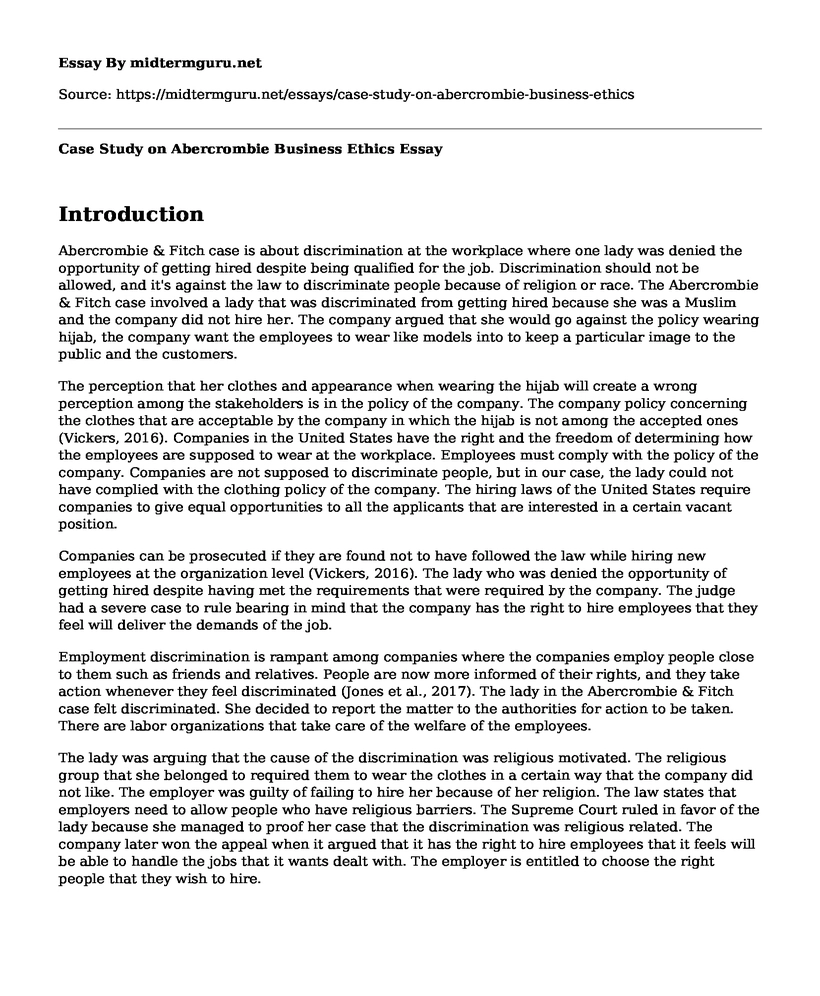Introduction
Abercrombie & Fitch case is about discrimination at the workplace where one lady was denied the opportunity of getting hired despite being qualified for the job. Discrimination should not be allowed, and it's against the law to discriminate people because of religion or race. The Abercrombie & Fitch case involved a lady that was discriminated from getting hired because she was a Muslim and the company did not hire her. The company argued that she would go against the policy wearing hijab, the company want the employees to wear like models into to keep a particular image to the public and the customers.
The perception that her clothes and appearance when wearing the hijab will create a wrong perception among the stakeholders is in the policy of the company. The company policy concerning the clothes that are acceptable by the company in which the hijab is not among the accepted ones (Vickers, 2016). Companies in the United States have the right and the freedom of determining how the employees are supposed to wear at the workplace. Employees must comply with the policy of the company. Companies are not supposed to discriminate people, but in our case, the lady could not have complied with the clothing policy of the company. The hiring laws of the United States require companies to give equal opportunities to all the applicants that are interested in a certain vacant position.
Companies can be prosecuted if they are found not to have followed the law while hiring new employees at the organization level (Vickers, 2016). The lady who was denied the opportunity of getting hired despite having met the requirements that were required by the company. The judge had a severe case to rule bearing in mind that the company has the right to hire employees that they feel will deliver the demands of the job.
Employment discrimination is rampant among companies where the companies employ people close to them such as friends and relatives. People are now more informed of their rights, and they take action whenever they feel discriminated (Jones et al., 2017). The lady in the Abercrombie & Fitch case felt discriminated. She decided to report the matter to the authorities for action to be taken. There are labor organizations that take care of the welfare of the employees.
The lady was arguing that the cause of the discrimination was religious motivated. The religious group that she belonged to required them to wear the clothes in a certain way that the company did not like. The employer was guilty of failing to hire her because of her religion. The law states that employers need to allow people who have religious barriers. The Supreme Court ruled in favor of the lady because she managed to proof her case that the discrimination was religious related. The company later won the appeal when it argued that it has the right to hire employees that it feels will be able to handle the jobs that it wants dealt with. The employer is entitled to choose the right people that they wish to hire.
Conclusion
In conclusion, discrimination at the workplace should not be allowed to take at the workplace, people need to be respected for who they are and the values that they stand for. Hiring should be done in an honest manner, and the best candidate is allowed to work for the company. Where there are accusations of discrimination evidence should be provided.
References
Vickers, L. (2016). Religious freedom, religious discrimination, and the workplace. Bloomsbury Publishing.
Jones, K. P., Arena, D. F., Nittrouer, C. L., Alonso, N. M., & Lindsey, A. P. (2017). Subtle discrimination in the workplace: A vicious cycle. Industrial and organizational psychology, 10(1), 51-76.
Cite this page
Case Study on Abercrombie Business Ethics. (2022, Dec 20). Retrieved from https://midtermguru.com/essays/case-study-on-abercrombie-business-ethics
If you are the original author of this essay and no longer wish to have it published on the midtermguru.com website, please click below to request its removal:
- Analysis of Apple Inc Company - Paper Example
- Example of a Report on Toyota And Its Business Level Strategies
- Volkswagen Scandal: Business Ethics Paper Example
- Research Paper on Marketing Strategy for Samsung Galaxy
- Essay Sample on Importance of Intracompany Guides to Employees
- New York Toy Fair: An Unforgettable Experience - Essay Sample
- Uniting Communities: United Way's Vision for a Better Future - Essay Sample







